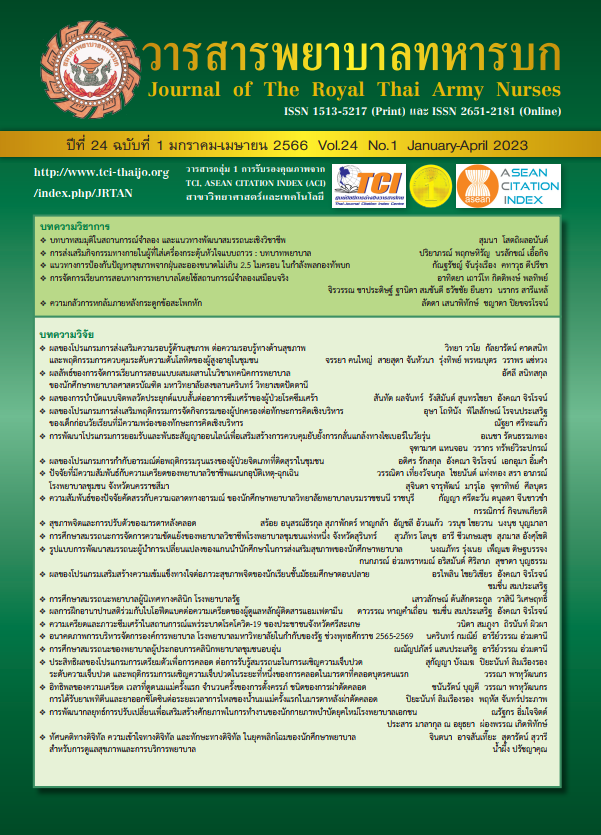Mental Health and Adaptation among Postpartum Mothers
Keywords:
mental health, postpartum adaptation, postpartum motherAbstract
This descriptive research aimed to study mental health, adaptation, and the associated between mental health and adaptation of postpartum mothers. The sample consisted of 119 postpartum mothers. The data were collected by mental health assessment form such as stress assessment form, depression risk assessment form, depression assessment form, and the clinical tool for assessing adaptation to motherhood. The confidence of evaluation form by Cronbach’s alpha coefficients were 0.74, 0.78, 0.77 and 0.92, respectively. The data were analyzed by descriptive statistics and chi-squares. The results showed that 14.3 percent of postpartum mothers had moderate to high stress level, 8.4 percent had risk of depression, 8.4 percent had mild to moderate depression level. Adaptation to maternal roles was low level at 10.1 percent. The stress was found to be statistic associated with postpartum adaptation (p<.05). The risk of depression and postpartum depression were no statistic associated with postpartum adaptation (p>.05).
Downloads
References
Department of Mental Health, Ministry of Public Health. Guidelines for using of mental health tools for public health personnel in community hospitals. Nonthaburi: Department of Mental Health, Department of Mental Health; 2015. (in Thai)
Lowdermilk D, Perry S, Cashion K. Maternal and women’s health care. 10th ed. USA: Elsevier; 2012.
Tahirkheli NN, Cherry AS, Tackett AP, McCaffree MA, Gillaspy SR. Postpartum depression on the neonatal intensive care unit: current perspectives. International Journal of Women’s Health 2014; 24(6): 975-87.
Duang-eaad K. Prevalence of postpartum depression in teenage pregnancy at Kuankanoon Hospital. Region 11 Medical Journal 2017; 31(3): 457-64. (in Thai)
Pukdeesamai A, Sriarporn P, Xuto P. Factors predicting postpartum depression among first-time mothers. Nursing Journal 2017; 44(3): 19-29. (in Thai)
Nuanchawee W, Thaweesak Kasiphon T, Kanokporn Nateethanasombat, K. The prevalence of postpartum depression and factors predicting depression in postpartum mothers. Journal of Health Science 2018; 21(42): 65-77. (in Thai)
Kittichotiwat W, Prevalence and associated factors of postpartum depression in Kaengkhoi Hospital, Saraburi Province. Journal of Medicine 2018; 43(5): 125-30. (in Thai)
Phumek S, Kovavisarat E, Kuanphakul M, Sangpitak W. Factors predicting depression of postpartum mothers who come to Rajavithi Hospital. Journal of Nursing and Health Research 2019; 35(3): 158-70. (in Thai)
Sitthiboonma N, Kantaruksa K, Supavititpatana B. Stress, social support and postpartum depression among first-time mothers. Nursing Journal 2020; 47(2): 169-79. (in Thai)
Anusornteerakul S, Ounkaew A, Hanklar S, Sitthi K, Booranasun T. The study of mental health and adaptation among postpartum mothers. Research report. Udonthani: Faculty of Nursing, Ratchathani University, Udonthani Campus; 2021. (in Thai)
Department of Health, Ministry of Public Health. Maternal and child health diary. Nonthaburi: Ministry of Public Health; 2020. (in Thai)
Pansi S, Phahuwatanakorn W, Yussamran C, Putdivarnichapong W. Adaptive factors influencing mental health of postpartum mothers. Journal of the Royal Thai Army Nurses 2019; 20(2): 160-69. (in Thai)
Boonyaporn T, Saetan C. Nursing role: stress management of pregnant teenage. The Southern College Network Journal of Nursing and Public Health 2017; 4(3): 271-81. (in Thai)
Cochran WC. Sampling techniques. 2nd ed. New York: John Wiley & Sons; 1973.
Bloom BS, Hasting JT, Madaus GF. Handbook on formative and summative evaluation of student learning. New York: McGraw-Hill; 1971.
Kiruthiga, V. Emotive whims distressing pregnant women. International Journal of Engineering and Technology 2017; 4(8): 2194-96.
Sunanta S, Yusamran C, Phahuwatanakorn W. Effect of providing knowledge and support primiparous adolescent mother and grandmother on maternal role attainment. Journal of the Royal Thai Army Nurses 2019; 17(2): 125-34. (In Thai)
Junsri S, Nitipong V, Rueangrong B. The factors related to postpartum depression in teenage mothers. Journal of the Royal Thai Army Nurses 2017; 8(3): 236-43. (in Thai)
Srisawad K, Panyapinitnukul C, Sonnark N. Health promoting behavior in pregnancy. Songklanagarind Journal of Nursing 2018; 38(2): 95-109. (in Thai)
Karuna P. Stress and coping mechanisms of mothers separated from their sick babies during postpartum period in Maharaj Nakhon Si Thammarat Hospital. Maharaj Nakhon Si Thammarat 2018; 1(2): 67-77. (in Thai)
Marshall JE, Raynor MD. Myles textbook of midwives. 17th ed. Poland: Elsevier; 2020.
Drake E, White MS. Postpartum adaptations and nursing care. In Murray S, Mckinney E, Holub KS, Jones R. (eds). Foundations of maternal-newborn and women’s health nursing. 7th ed. St. Louis Missouri: Elsevier; 2019. : 458-64.
Saenbunma K, Deoisres W, Chuahom U. Predictors of postpartum depression among women with emergency cesarean section. The Journal of Faculty of Nursing Burapha University 2019; 27(3): 23-31. (in Thai)
Hassanzadeh R, Abbas-Alizadeh F, Meeda S, Alizadeh-Charandabi SM, Mirghafourvand M. Fear of childbirth, anxiety and depression in three groups of primiparous pregnant women not attending, irregularly attending and regularly attending childbirth preparation classes. BMC Women Health 2020; 20(180): 1-8.
Downloads
Published
How to Cite
Issue
Section
License
Copyright (c) 2023 Journal of The Royal Thai Army Nurses

This work is licensed under a Creative Commons Attribution-NonCommercial-NoDerivatives 4.0 International License.
บทความหรือข้อคิดเห็นใดใดที่ปรากฏในวารสารพยาบาลทหารบกเป็นวรรณกรรมของผู้เขียน ซึ่งบรรณาธิการหรือสมาคมพยาบาลทหารบก ไม่จำเป็นต้องเห็นด้วย
บทความที่ได้รับการตีพิมพ์เป็นลิขสิทธิ์ของวารสารพยาบาลทหารบก
The ideas and opinions expressed in the Journal of The Royal Thai Army Nurses are those of the authors and not necessarily those
of the editor or Royal Thai Army Nurses Association.






